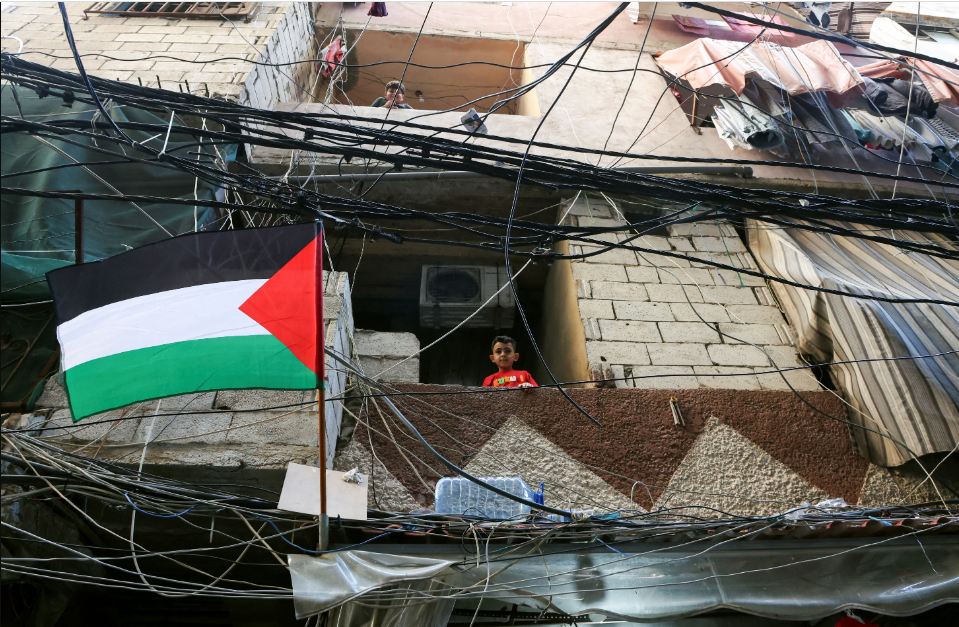Clashes on border with Israel uproot thousands in Lebanon – again
Beirut (Reuters) – Rose Rostom, Nahida Mashouz and Ammar Hajeh have had their lives uprooted many times – by Palestinian militants, Syrian warplanes, Islamic State, Western-backed forces or the Israeli army.
Between them, they have fled their homes 20 times, most recently following border clashes between Israeli forces and the Iran-backed Hezbollah group sparked by Israel’s war with Hamas militants in Gaza.
Rostom is Lebanese, Mashouz is a refugee from Syria and Hajeh is a Palestinian refugee.
Israeli bombardment forced Rostom from her home in south Lebanon and drove Mashouz from her temporary accommodation nearby. Hajeh has fled his crowded refugee camp four times this year during fighting between militant groups.
Their circumstances differ, but all three worry about the future in a country that has repeatedly been rocked by civil strife and was in dire straits and racked by social tensions even before the latest violence compounded economic problems.
Since the Israel-Hamas war began seven weeks ago in Gaza, the clashes on Lebanon’s border with Israel have displaced nearly 50,000 people, according to U.N. figures, and at least 13 civilians have been killed in Lebanon, Lebanese officials say.
“The Gaza war began, Hezbollah started firing at Israel, and then shells began landing around our house. Conflict drove me from home for the third time in my life,” Rostom said.
She and her husband, two sons and grandchildren are now staying at her brother-in-law’s home in the coastal city of Sidon. During Lebanon’s civil war in the 1980s she moved twice, once under Israeli bombardment and once fleeing Palestinian militant attacks.
Mashouz left the Syrian city of Raqqa when it was held by Islamic State, departing shortly before her house there was bombed as U.S.-backed forces began an assault.
Israeli shelling this month next to the building where she and her family lived, in an area near Rostom’s home – a cluster of towns at the Lebanon-Israel border – wounded her teenage daughter.
“We thought we’d finally found a stable life in southern Lebanon. Those hopes are shattered. We don’t know where to go,” she said, speaking from a crowded house in the Bekaa valley where three other newly displaced Syrian families were also sheltering.
A Struggling State
Lebanon is a country of perpetually displaced people.
The influx of Palestinians after the creation of Israel in 1948 helped spark the Lebanese civil war decades later, redrawing its sectarian map as people fled fighting. A 2006 war between Israel and Hezbollah displaced hundreds of thousands.
The arrival of 1.5 million Syrian refugees during Syria’s civil war which started in 2011 put new strain on Lebanon, and spilled into Europe as refugees migrated via dangerous sea routes.
Recent displacements are fewer but likely to increase if conflict continues, and this time the country is less prepared.
A 2019 financial collapse destroyed Lebanon’s economy and left its institutions in tatters. Israeli strikes and shells have destroyed farmland and homes, wiping out income, savings and jobs.
“My husband’s car parts shop has now closed during fighting,” Rostom said, checking news to see if her house was among the latest hit by rockets.
Another Lebanese family, whose home was destroyed by a rocket, said they cannot afford renovations and were in effect homeless.
Mashouz’s three sons have lost their jobs at a local bakery by moving. Her wounded daughter’s hospital treatment all but wiped out their savings.
“We’ve got $750 left in the world,” Mashouz said.
Jacob Boswall, Leader of the Lebanon Crisis Analysis Team at aid agency Mercy Corps, said Lebanon was straining to absorb this latest shock.
“If you look at the government’s contingency plan, it doesn’t have money to deal with this from a central point of view … it’s a whole host of different pressures on the state,” he said.
‘What About US?’
Tension is rising between locals and refugees.
Information Minister Ziad Makary said this month that Lebanon was suffering from an exodus of Lebanese and was burdened by Syrians. “We’re losing the best and getting the worst,” he was quoted as saying by local media.
Charbel Alam, a barber in the southern town of Rmeich which is regularly hit by shelling, said he has stayed to stop Syrian refugees who he says are trying to move into abandoned homes.
“We’ve formed groups to stop that happening,” he said, without giving details. “International organisations are helping Syrians but what about us?”
Syrians and Palestinians are again eyeing Europe.
Hajeh, the Palestinian refugee, left Yarmouk refugee camp in Syria in 2013 under the bombs of Syrian warplanes.
In Ain El Hilweh, a Palestinian camp in southern Lebanon where Hajeh now lives, he, his mother and sister depend on $250 a month in aid from the U.N. Palestinian refugee agency, he says.
Work is scarce and he has fled his apartment to stay with relatives outside the camp 15 times since 2013 during clashes among rival Palestinian factions.
He says anti-Palestinian and Syrian racism is intensifying, and worries that when the Gaza war ends, infighting between Palestinian factions will resume in Ain El Hilweh.
“People don’t like us, they don’t like Syrians, and Palestinian gunmen will turn on each other again at some point,” he said.
“Everyone wants to leave. They’re ready to take the sea route.”



